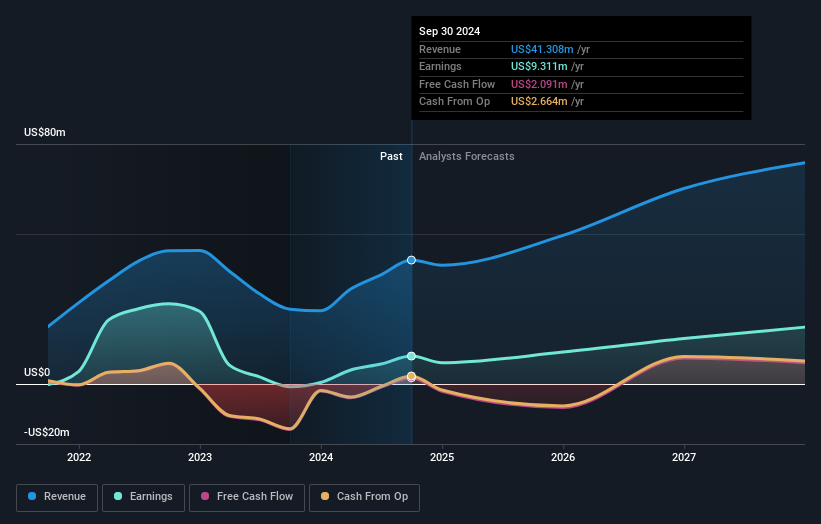- United States
- /
- Medical Equipment
- /
- NasdaqCM:SRTS
Sensus Healthcare, Inc. (NASDAQ:SRTS) surges 15%; retail investors who own 56% shares profited along with institutions

Key Insights
- Sensus Healthcare's significant retail investors ownership suggests that the key decisions are influenced by shareholders from the larger public
- 39% of the business is held by the top 25 shareholders
- Insider ownership in Sensus Healthcare is 20%
A look at the shareholders of Sensus Healthcare, Inc. (NASDAQ:SRTS) can tell us which group is most powerful. We can see that retail investors own the lion's share in the company with 56% ownership. That is, the group stands to benefit the most if the stock rises (or lose the most if there is a downturn).
Following a 15% increase in the stock price last week, retail investors profited the most, but institutions who own 24% stock also stood to gain from the increase.
In the chart below, we zoom in on the different ownership groups of Sensus Healthcare.
See our latest analysis for Sensus Healthcare

What Does The Institutional Ownership Tell Us About Sensus Healthcare?
Institutional investors commonly compare their own returns to the returns of a commonly followed index. So they generally do consider buying larger companies that are included in the relevant benchmark index.
Sensus Healthcare already has institutions on the share registry. Indeed, they own a respectable stake in the company. This implies the analysts working for those institutions have looked at the stock and they like it. But just like anyone else, they could be wrong. When multiple institutions own a stock, there's always a risk that they are in a 'crowded trade'. When such a trade goes wrong, multiple parties may compete to sell stock fast. This risk is higher in a company without a history of growth. You can see Sensus Healthcare's historic earnings and revenue below, but keep in mind there's always more to the story.

Sensus Healthcare is not owned by hedge funds. Edwin Solot is currently the company's largest shareholder with 9.4% of shares outstanding. Meanwhile, the second and third largest shareholders, hold 7.2% and 4.8%, of the shares outstanding, respectively. Joseph Sardano, who is the second-largest shareholder, also happens to hold the title of Chief Executive Officer.
Our studies suggest that the top 25 shareholders collectively control less than half of the company's shares, meaning that the company's shares are widely disseminated and there is no dominant shareholder.
While studying institutional ownership for a company can add value to your research, it is also a good practice to research analyst recommendations to get a deeper understand of a stock's expected performance. Quite a few analysts cover the stock, so you could look into forecast growth quite easily.
Insider Ownership Of Sensus Healthcare
The definition of company insiders can be subjective and does vary between jurisdictions. Our data reflects individual insiders, capturing board members at the very least. Company management run the business, but the CEO will answer to the board, even if he or she is a member of it.
Insider ownership is positive when it signals leadership are thinking like the true owners of the company. However, high insider ownership can also give immense power to a small group within the company. This can be negative in some circumstances.
Our most recent data indicates that insiders own a reasonable proportion of Sensus Healthcare, Inc.. Insiders have a US$22m stake in this US$113m business. This may suggest that the founders still own a lot of shares. You can click here to see if they have been buying or selling.
General Public Ownership
The general public, mostly comprising of individual investors, collectively holds 56% of Sensus Healthcare shares. This level of ownership gives investors from the wider public some power to sway key policy decisions such as board composition, executive compensation, and the dividend payout ratio.
Next Steps:
I find it very interesting to look at who exactly owns a company. But to truly gain insight, we need to consider other information, too. Consider for instance, the ever-present spectre of investment risk. We've identified 1 warning sign with Sensus Healthcare , and understanding them should be part of your investment process.
But ultimately it is the future, not the past, that will determine how well the owners of this business will do. Therefore we think it advisable to take a look at this free report showing whether analysts are predicting a brighter future.
NB: Figures in this article are calculated using data from the last twelve months, which refer to the 12-month period ending on the last date of the month the financial statement is dated. This may not be consistent with full year annual report figures.
New: Manage All Your Stock Portfolios in One Place
We've created the ultimate portfolio companion for stock investors, and it's free.
• Connect an unlimited number of Portfolios and see your total in one currency
• Be alerted to new Warning Signs or Risks via email or mobile
• Track the Fair Value of your stocks
Have feedback on this article? Concerned about the content? Get in touch with us directly. Alternatively, email editorial-team (at) simplywallst.com.
This article by Simply Wall St is general in nature. We provide commentary based on historical data and analyst forecasts only using an unbiased methodology and our articles are not intended to be financial advice. It does not constitute a recommendation to buy or sell any stock, and does not take account of your objectives, or your financial situation. We aim to bring you long-term focused analysis driven by fundamental data. Note that our analysis may not factor in the latest price-sensitive company announcements or qualitative material. Simply Wall St has no position in any stocks mentioned.
About NasdaqCM:SRTS
Sensus Healthcare
A medical device company, manufactures and sells radiation therapy devices to healthcare providers worldwide.
Flawless balance sheet and undervalued.
Similar Companies
Market Insights
Community Narratives



